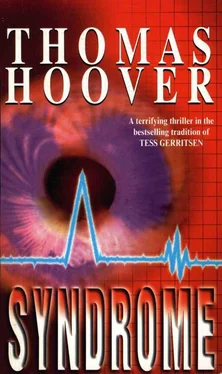Thomas Hoover - Syndrome
Здесь есть возможность читать онлайн «Thomas Hoover - Syndrome» весь текст электронной книги совершенно бесплатно (целиком полную версию без сокращений). В некоторых случаях можно слушать аудио, скачать через торрент в формате fb2 и присутствует краткое содержание. Жанр: Триллер, на английском языке. Описание произведения, (предисловие) а так же отзывы посетителей доступны на портале библиотеки ЛибКат.
- Название:Syndrome
- Автор:
- Жанр:
- Год:неизвестен
- ISBN:нет данных
- Рейтинг книги:4 / 5. Голосов: 1
-
Избранное:Добавить в избранное
- Отзывы:
-
Ваша оценка:
- 80
- 1
- 2
- 3
- 4
- 5
Syndrome: краткое содержание, описание и аннотация
Предлагаем к чтению аннотацию, описание, краткое содержание или предисловие (зависит от того, что написал сам автор книги «Syndrome»). Если вы не нашли необходимую информацию о книге — напишите в комментариях, мы постараемся отыскать её.
Syndrome — читать онлайн бесплатно полную книгу (весь текст) целиком
Ниже представлен текст книги, разбитый по страницам. Система сохранения места последней прочитанной страницы, позволяет с удобством читать онлайн бесплатно книгу «Syndrome», без необходимости каждый раз заново искать на чём Вы остановились. Поставьте закладку, и сможете в любой момент перейти на страницу, на которой закончили чтение.
Интервал:
Закладка:
Winston Bartlett had liked the sound of that, and Karl Van de Vliet had his white knight.
Once his financing was secure, he decided to begin by solving the problem that had dogged him at Stanford. Since there would always be a distracting public-relations problem hounding any researcher in the United States who made use of aborted embryos, even if it was to save lives, he was determined to find a less controversial way to trick Mother Nature and garner "pluripotent" stem cells, the name given those that could give rise to virtually any tissue type.
He had. After he moved his research team into the Dorian Institute just over 4 1/2 years ago, he had perfected a way to use a human protein, an enzyme called telomerase, to make adult stem cells do most of the miracles once only thought possible with embryonic cells.
The phase-three clinical trials over the past seven months had proved conclusively that the technique worked. Adult stem cells, when treated with the telomerase enzyme to arrest the process of cell senescence, could indeed regenerate everything from the human brain to the human heart, from Parkinson's to acute myocardial infarction.
Twenty-three days from now, when the phase-three clinical trials were formally scheduled to be completed, Karl Van de Vliet would have enough data for the National Institutes of Health to confirm one of the most important breakthroughs in the history of medicine.
Unfortunately, however, there was that other bit of data that he would not be sharing with the NIH. The Beta.
Thinking about that, his heart heavy, he turned back to the situation at hand.
"Emma, you're making wonderful progress," he continued on with the banter, "but don't push yourself too hard just yet."
She laughed, sending lines across her forehead. Her voice was deep and rich, sultry in its own way. "When you get as old as I am, honey, you do anything you can get away with. What am I saving it for? I just might go to Atlantic City next week and pick up a sailor."
"Well, then, I may have to have Shelly go along and keep an eye on you," he said with one last programmed smile. Then he checked his watch. Bartlett should be arriving any minute now. Time to get Emma Rosen the hell out of here and back upstairs.
He turned and signaled for Ellen O'Hara, the head nurse, to start removing the suction-cup electrodes that had been stuck on Emma for her EKG. Ellen had been with him when he was at Stanford and her loyalty was unquestioned. She had made sure that the Beta disaster with Kristen hadn't become the gossip of the institute. Still, how much longer could it be kept quiet?
Then Sandra Hanes, the lively, dark-haired woman in charge of the second floor for this shift, walked into the examination room. She knew nothing about Kristen.
"Perfect timing," he said. Then he drew her aside. "Keep an eye on Emma, will you? Try and keep her in her room and quiet as much as you can. The last blood work showed her white-cell count over twelve K/CMM. It could mean there's some minimal rejection rearing its head. Probably nothing to worry about, but can you just keep her away from the stairs for godsake? I don't want her tiring herself out."
"I'll tie her to the bed if I have to," Sandra answered. The clinical trials had required a mountain of paperwork, and her face was strained from working long shifts, including a lot of weekends, like this one. But he suspected she actually appreciated the overtime. She was forty-five, divorced and putting a straight-A daughter through Rutgers.
She also was a first-rate nurse, like all the others at the institute, and her loyalty couldn't be more secure. Still, he knew that she and all the other staffers were bursting to tell the world about the miracles they'd witnessed. That was why Bartlett had insisted on an ironclad nondisclosure agreement in the contract of every employee to be strictly enforced. (And to put teeth into the security, all employees were body-searched for documents or cameras or tapes on the way in and out.) To violate it would be to open yourself to a life-altering lawsuit. During World War II the claim had been that "loose lips sink ships." Here they would render you a pauper for life. Nobody dared even whisper about the spectacular success of the clinical trials.
As the examining room emptied out, he checked his watch one more time. Winston Bartlett was due any minute now and he had nothing but bad news for the man.
Trying to control his distress, he walked to the end of the hallway and prepared to enter the lab. Whereas the ground floor and the two above were for reception, common dining, and individual rooms, the basement contained the laboratory, his private office, the examination rooms, and an OR (never yet used, thankfully). There also was a sub-basement, accessible only through an elevator in the lab or an alarmed set of fire stairs. It was an intensive-care area, and it was where Kristen, the Beta casualty, was being kept.
He zipped a magnetic card through the reader on the door and entered the air lock. The lab was maintained under positive pressure to keep out the slightest hint of any kind of contaminant. It was as sterile as a silicon chip factory.
The room was dominated by a string of black slate workbenches, then rows and rows of metal shelves with tissue- containing vials of a highly volatile solvent cocktail he had engineered especially for this project, along with a computer network and a huge autoclave and several electron microscopes.
He walked in and greeted his research team. He'd managed to keep the core group that had been closest to him at Stanford, four people who, he believed, were among the finest medical minds in the country. They were the renowned molecular biologist David Hopkins, Ph.D., the strikingly beautiful and widely published endocrinologist Debra Connolly, M.D., and two younger staffers, a couple who'd met and married at his Stanford lab, Ed and Beth Sparks, both Ph.D.'s who'd done their post-doc under him. They all were here now in the wilds of northern New Jersey because they knew they were making medical history.
David was waiting, his long shaggy forelock down over his brow as always. But his eyes told it all.
"Karl, Bartlett's blood work from yesterday just got faxed up from the lab at Princeton. His enzyme level has increased another three point seven percent."
"Damn." It was happening for sure. "Did you run-"
"The computer simulation? A one-standard-deviation estimate is that he's going to go critical sometime between seventeen and nineteen days."
"The Syndrome." Van de Vliet sighed.
"Just like Kristen."
"She faked us out. There were no side effects for weeks." Van de Vliet shook his head sadly as he set his handheld Palm computer onto a side table. Later he would transfer all the day’s patient data into the laboratory's server, the Hewlett- Packard they all affectionately called the Mothership. Then he began taking off his white coat.
"Bartlett looks to be inevitable now." David exhaled in impotent despair. The frustration and the tension were getting to everybody. They all knew what was at stake. "It's in two and a half weeks, give or take."
What had supposedly been a cosmetic procedure had gone horribly awry. Van de Vliet wondered if it wasn't the ultimate vengeance of the quest for something you shouldn't have.
"His AB blood type is so rare. If we'd just kept a sample before the procedure, we'd have something to work with now," Van de Vliet said sadly. "We still might be able to culture some antibodies."
He hadn't told his research team yet about the other possible option-using somebody else as an AB blood-type incubator.
His last-ditch idea was to find a patient with a blood type of AB positive and introduce a small quantity of the special Beta telomerase enzyme into them. The theory was that this might induce their body to produce compatible antibodies, which could then be extracted and cultured in the laboratory. If a sufficient quantity could be produced they could be injected into Bartlett and hopefully arrest the enzyme's pattern of entering the host's bloodstream and metastasizing into the more complex form that brought on the Syndrome. And if it did work, then there might even be some way to adapt the procedure to Kristen.
Читать дальшеИнтервал:
Закладка:
Похожие книги на «Syndrome»
Представляем Вашему вниманию похожие книги на «Syndrome» списком для выбора. Мы отобрали схожую по названию и смыслу литературу в надежде предоставить читателям больше вариантов отыскать новые, интересные, ещё непрочитанные произведения.
Обсуждение, отзывы о книге «Syndrome» и просто собственные мнения читателей. Оставьте ваши комментарии, напишите, что Вы думаете о произведении, его смысле или главных героях. Укажите что конкретно понравилось, а что нет, и почему Вы так считаете.












